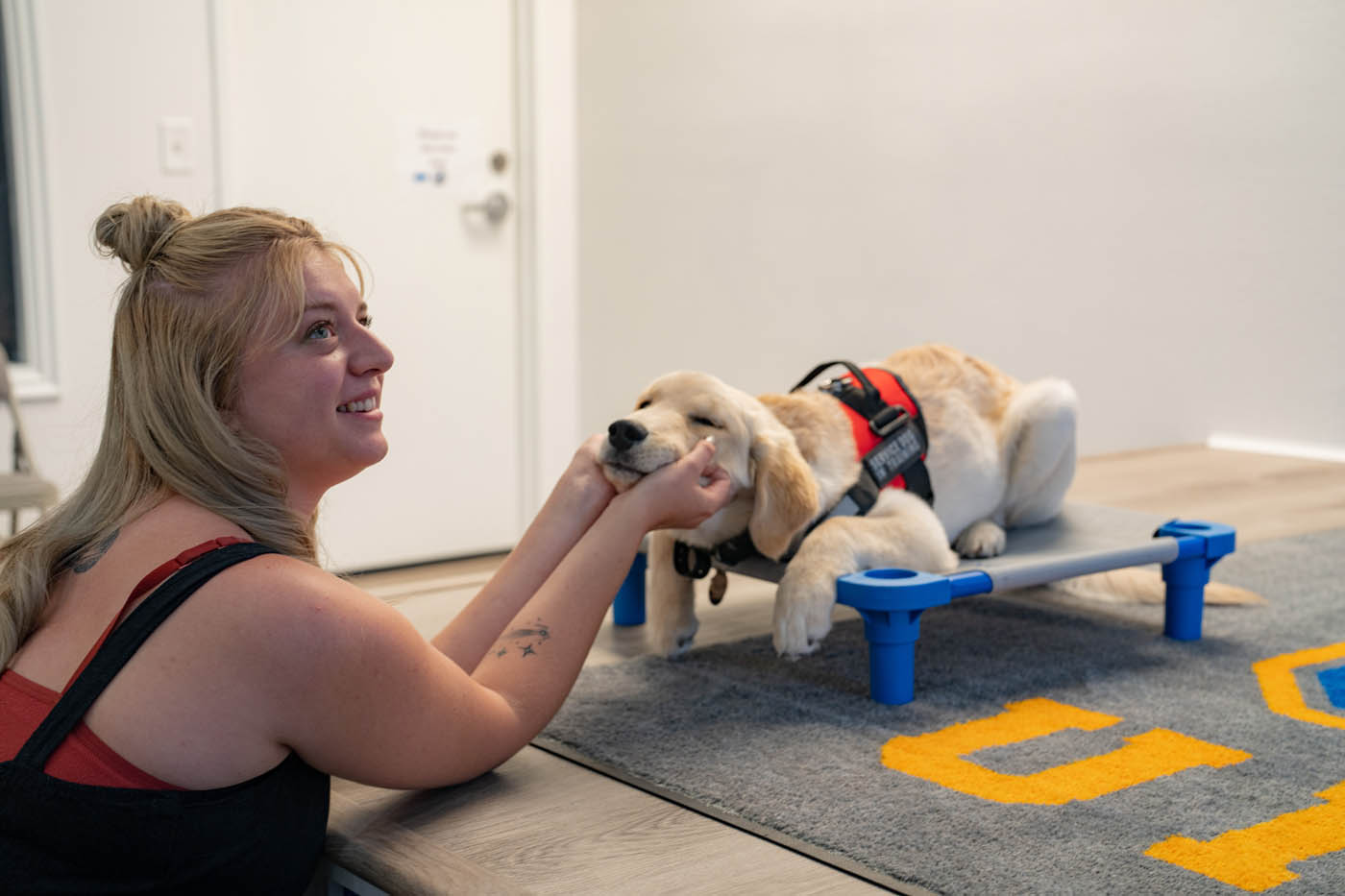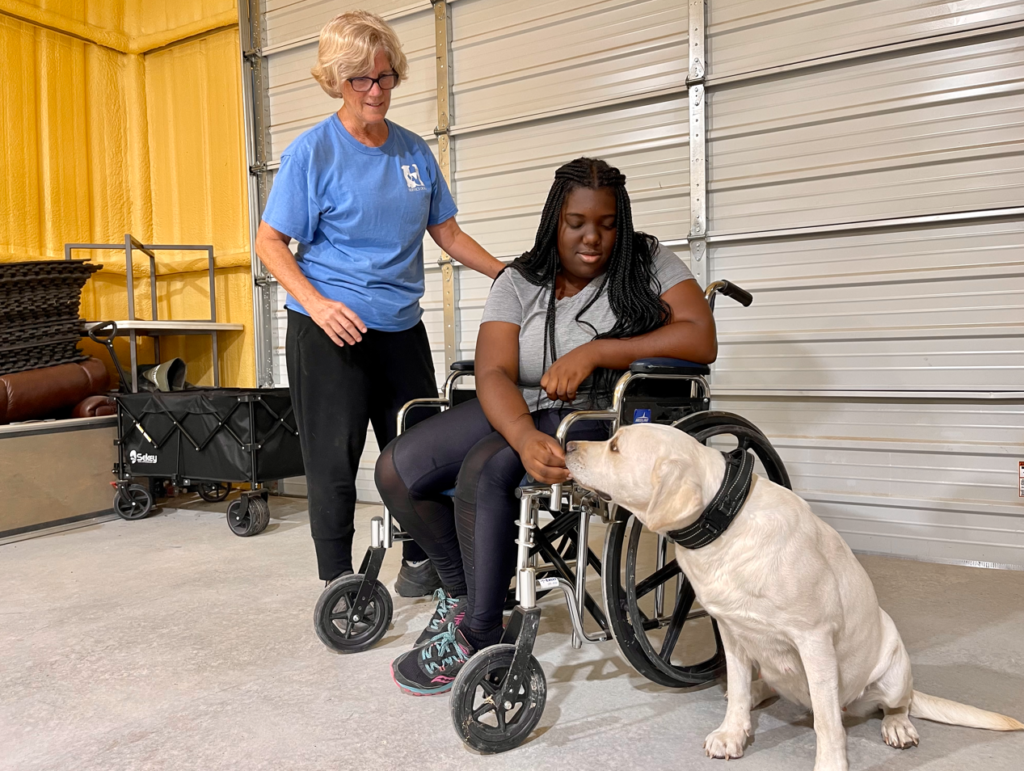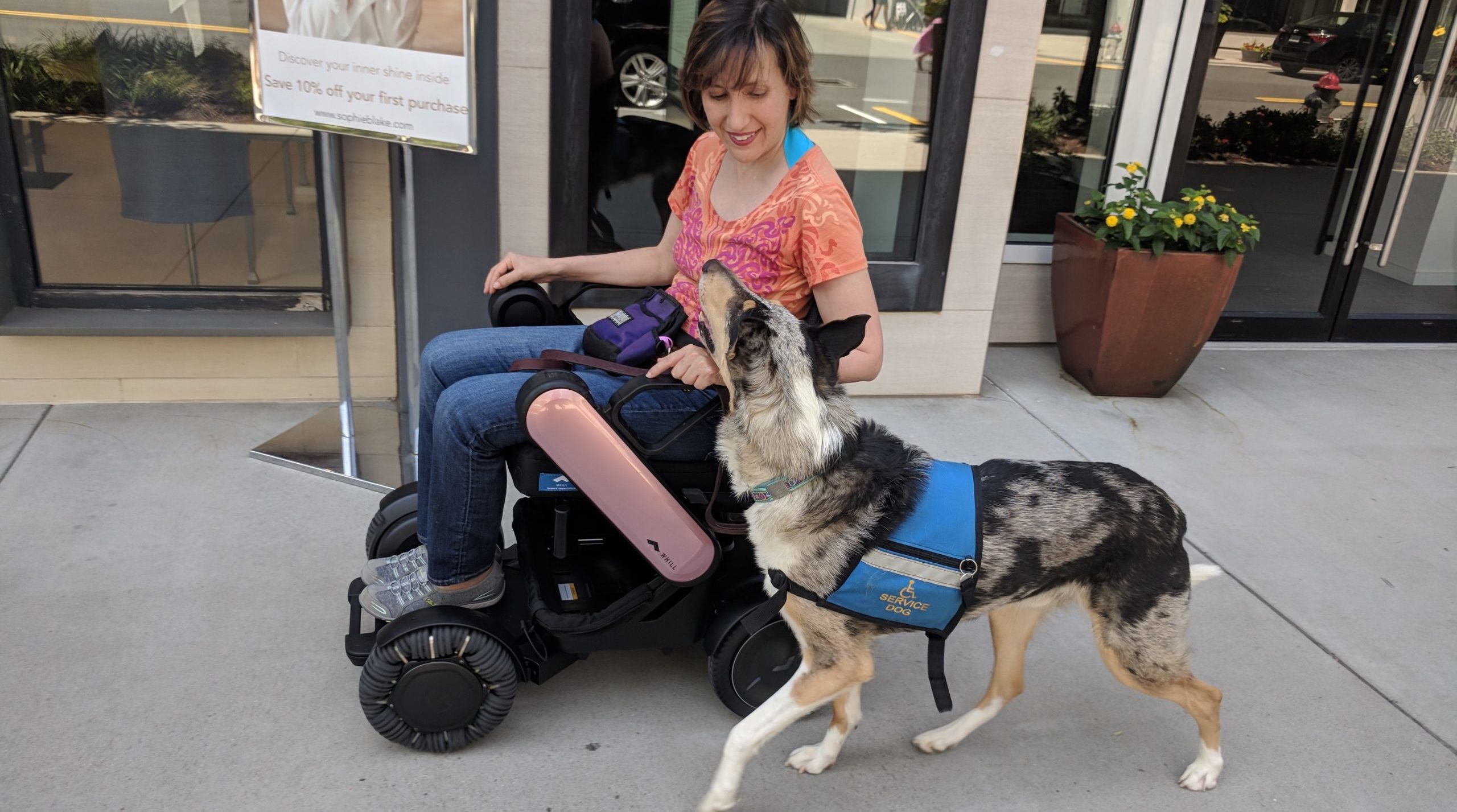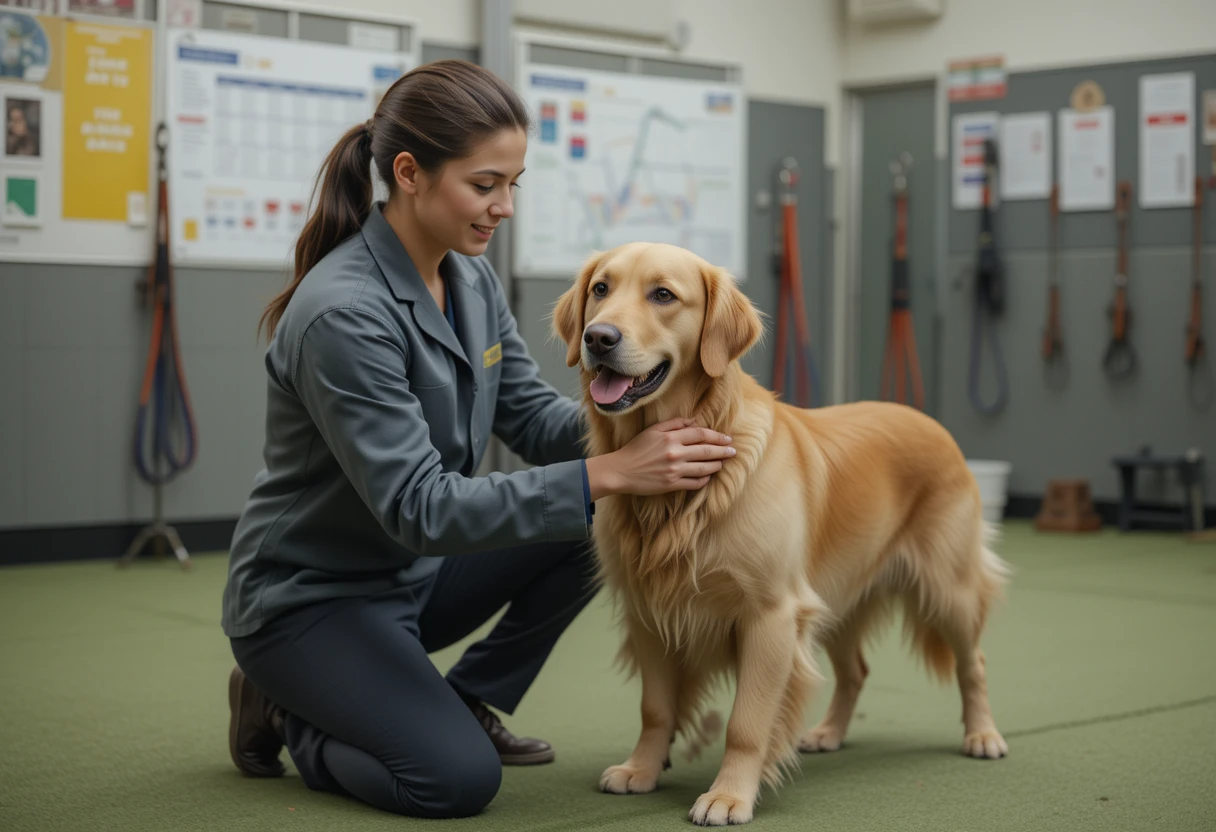In today’s world where mental health awareness is at an all-time high, the demand for psychiatric service dogs has grown exponentially. If you’re passionate about helping people with mental health conditions while working with dogs, becoming a psychiatric service dog trainer could be your perfect career path.
This comprehensive guide will walk you through everything you need to know about how to become a psychiatric service dog trainer, from educational requirements to career prospects.

Understanding the Role of a Psychiatric Service Dog Trainer
A psychiatric service dog trainer specializes in training dogs to perform specific tasks that assist individuals with mental health conditions such as anxiety, depression, PTSD, bipolar disorder, and other psychiatric disabilities. Unlike emotional support animals that provide comfort through companionship, psychiatric service dogs are trained to perform specific tasks that mitigate their handler’s disability symptoms.
These specialized trainers work at the intersection of animal behavior and human psychology, creating life-changing partnerships between dogs and individuals with mental health conditions. The role requires not only expertise in dog training but also understanding of various mental health conditions and their symptoms.
Educational Foundation for Psychiatric Service Dog Training
Core Academic Requirements
While there are no federally mandated educational requirements to become a psychiatric service dog trainer, most successful professionals possess a strong foundation in several key areas:
Animal Behavior and Psychology: Understanding canine behavior, learning theory, and animal psychology forms the backbone of effective service dog training. Many trainers pursue degrees in animal science, psychology, or related fields.
Mental Health Knowledge: Since psychiatric service dogs work specifically with individuals who have mental health conditions, trainers benefit from coursework in psychology, counseling, or mental health studies.
Basic Veterinary Knowledge: Understanding canine health, nutrition, and medical care ensures trainers can maintain the physical well-being of dogs throughout the training process.
Professional Certification Programs
Several organizations offer specialized certification programs for aspiring psychiatric service dog trainers:
Animal Behavior College (ABC): Offers a comprehensive Service Dog Trainer certification program that covers both theoretical knowledge and practical training techniques.
Bergin University of Canine Studies: The only accredited university in the world specifically focused on canine studies, offering Associate’s, Bachelor’s, and Master’s degrees in Canine Studies.
Certification Council for Professional Dog Trainers (CCPDT): Provides certification for professional dog trainers, including specialized knowledge areas relevant to service dog training.

Essential Skills and Qualifications
Technical Skills Required
Dog Training Expertise: Master various training methodologies, with emphasis on positive reinforcement techniques that work best for service dog training.
Task-Specific Training: Learn to train dogs for psychiatric-specific tasks such as:
- Deep Pressure Therapy (DPT)
- Medical alert and intervention
- Grounding techniques during panic attacks
- Medication reminders
- Creating personal space in crowded areas
- Interrupting nightmares or dissociative episodes
Public Access Training: Ensure dogs can behave appropriately in all public settings, as required by the Americans with Disabilities Act (ADA).
Interpersonal Skills
Communication: Ability to work effectively with clients who have various mental health conditions, often requiring patience and understanding.
Empathy and Compassion: Understanding the challenges faced by individuals with psychiatric disabilities and the life-changing impact of a well-trained service dog.
Problem-Solving: Each dog and handler team presents unique challenges requiring creative training solutions.
Career Pathways and Training Routes
Apprenticeship Programs
Most reputable service dog organizations offer 2-3 year apprenticeship programs. Organizations like Assistance Dogs International (ADI) member groups provide structured training that includes:
- Year 1: Basic dog handling, kennel management, and foundational training principles
- Year 2: Advanced training techniques, client interaction, and specialized task training
- Year 3: Independent training responsibilities and program management
According to Dogs for Better Lives, their apprenticeship program typically takes 3-4 years and provides comprehensive paid training for future assistance dog trainers.
Independent Study and Online Programs
Service Dog Training School International: Offers specialized courses in psychiatric service dog training with comprehensive curricula covering both theory and practical application.
Cooperative Paws: Provides a Service Dog Coaching Certificate Program focusing on positive reinforcement methods and specialized task training.
Starting Your Own Practice
Some trainers choose to establish independent practices, though this requires:
- Extensive experience and proven track record
- Business management skills
- Understanding of ADA regulations
- Liability insurance and proper licensing

Understanding Psychiatric Service Dog Specific Training
Core Training Components
Basic Obedience and Public Access: Before any specialized training begins, dogs must master fundamental commands and public behavior standards. This includes:
- Sit, stay, down, come, heel commands
- Appropriate behavior in stores, restaurants, and public transportation
- No aggressive behavior toward humans or other animals
- Remaining calm in crowded or noisy environments
Specialized Psychiatric Tasks: Training varies based on the handler’s specific mental health condition:
For Anxiety and Panic Disorders:
- Deep Pressure Therapy: Training dogs to apply firm, calming pressure during anxiety episodes
- Grounding techniques: Interrupting dissociation or panic attacks through physical contact
- Creating space: Positioning between handler and crowds in overwhelming situations
For PTSD:
- Nightmare interruption: Waking handlers from nightmares through gentle nudging
- Hypervigilance reduction: Performing room searches to help handler feel secure
- Flashback interruption: Recognizing signs of flashbacks and providing grounding
For Depression:
- Medication reminders: Bringing medication containers at scheduled times
- Activity encouragement: Motivating handler to engage in daily activities
- Mobility assistance: Providing stability during dizzy spells or fatigue
Training Methodologies
Positive Reinforcement: The gold standard for psychiatric service dog training, this method builds confidence and strengthens the handler-dog bond essential for psychiatric work.
Clicker Training: Provides precise timing for task training, particularly effective for complex psychiatric tasks requiring specific responses to subtle cues.
Environmental Training: Gradual exposure to various environments ensures dogs can perform tasks consistently regardless of location or distractions.
Certification and Regulatory Considerations
ADA Compliance and Legal Framework
Understanding the legal landscape is crucial for psychiatric service dog trainers:
No Federal Certification Requirement: Unlike some other professions, there is no federally mandated certification for service dog trainers. However, this doesn’t diminish the importance of proper training and credentials.
ADA Requirements: Service dogs must be individually trained to perform tasks directly related to their handler’s disability. Trainers must ensure dogs meet these standards.
State Variations: Some states have specific regulations regarding service dogs in training and their access to public spaces during the training process.
Professional Standards
Assistance Dogs International (ADI): While not required, ADI membership and adherence to their standards demonstrates commitment to excellence and ethical practices.
Continuing Education: The field evolves constantly, requiring ongoing education in both training techniques and mental health understanding.

Career Prospects and Salary Expectations
Employment Opportunities
Non-Profit Organizations: Many trainers work for established service dog organizations, typically starting as apprentices and advancing to senior trainer positions.
Private Training Companies: Growing demand has created opportunities with private companies specializing in psychiatric service dog training.
Independent Practice: Experienced trainers may establish their own training businesses, offering specialized services to clients.
Educational Institutions: Opportunities exist in teaching roles at universities or professional training programs.
Salary Range and Benefits
According to recent industry data:
Entry-Level Positions: $23,500 – $35,000 annually for apprentices and new trainers Experienced Trainers: $40,000 – $66,500 annually depending on location and specialization Private Practice: $50 – $150 per hour for specialized psychiatric service dog training
The Bureau of Labor Statistics reports that animal trainers earned a median annual wage of $38,750 in 2024, with growth projected to be faster than average due to increasing awareness of service animal benefits.
Job Market Outlook
The demand for psychiatric service dog trainers continues to grow due to:
- Increased mental health awareness
- Growing acceptance of psychiatric service dogs
- Expanded understanding of PTSD in military veterans
- Rising anxiety and depression rates requiring alternative treatments
How to Become a Psychiatric Service Dog Trainer: Step-by-Step Career Guide
Phase 1: Foundation Building (Months 1-12)
Gain Basic Dog Training Experience: Start with general dog training to understand canine behavior and basic training principles.
Volunteer with Service Dog Organizations: Many organizations rely on volunteers for puppy raising, basic training assistance, and administrative support.
Pursue Relevant Education: Enroll in animal behavior courses, mental health coursework, or formal certification programs.
Network with Professionals: Attend industry conferences, join professional organizations, and connect with established trainers.
Phase 2: Specialized Training (Years 1-3)
Apply for Apprenticeships: Submit applications to reputable service dog organizations offering structured training programs.
Develop Specialization: Focus on psychiatric-specific training techniques and gain experience with various mental health conditions.
Build Client Interaction Skills: Learn to work sensitively with individuals who have mental health conditions.
Document Your Progress: Maintain detailed records of training successes and client outcomes.
Phase 3: Professional Development (Years 3+)
Pursue Advanced Certifications: Obtain specialized certifications in psychiatric service dog training or related fields.
Consider Specialization: Focus on specific conditions (PTSD, anxiety, depression) or populations (veterans, children, adults).
Explore Teaching Opportunities: Share your expertise through workshops, seminars, or formal educational programs.
Stay Current: Participate in continuing education to stay updated on best practices and new developments.
For those interested in natural care techniques, check out our detailed guide on How to Use Natural Remedies for Dog Ear Infection Without a Vet.
Challenges and Rewards of the Profession
Common Challenges
Emotional Demands: Working with individuals who have mental health conditions requires emotional resilience and professional boundaries.
Physical Requirements: Training involves long hours of physical activity, outdoor work in various weather conditions, and handling dogs of all sizes.
Variable Success Rates: Not every dog-handler pairing succeeds, requiring patience and persistence.
Regulatory Complexity: Navigating ADA requirements and state-specific regulations requires ongoing attention to legal details.
Professional Rewards
Life-Changing Impact: Few careers offer the opportunity to so dramatically improve someone’s quality of life and independence.
Working with Animals: Daily interaction with dogs provides inherent job satisfaction for animal lovers.
Continuous Learning: The field constantly evolves, offering ongoing intellectual challenges and growth opportunities.
Community Building: Creating connections between people with disabilities and supportive communities.

Technology and Modern Training Methods
Innovative Training Tools
Digital Training Platforms: Online training programs like those offered by Pettable provide accessible education for both trainers and handlers.
Video Analysis: Recording training sessions allows for detailed analysis and improvement of both dog performance and training techniques.
Biometric Monitoring: Emerging technology allows monitoring of both dog and handler stress levels during training and task performance.
Remote Training Options
The COVID-19 pandemic accelerated the development of remote training options:
- Virtual consultations with clients
- Online training program delivery
- Remote progress monitoring
- Digital certification processes
Professional Organizations and Resources
Key Organizations
Assistance Dogs International (ADI): The premier organization for assistance dog providers worldwide, offering standards, resources, and networking opportunities.
International Association of Assistance Dog Partners (IAADP): Provides resources for both trainers and handlers, focusing on advocacy and education.
Psychiatric Service Dog Partners: Specializes specifically in psychiatric service dogs, offering training resources and support.
Essential Resources
Professional Publications: Stay current with journals like “Applied Animal Behaviour Science” and “Journal of Veterinary Medical Education.”
Industry Conferences: Annual conferences provide networking opportunities and continuing education credits.
Online Communities: Professional forums and social media groups offer peer support and knowledge sharing.
Specialization Opportunities
Veteran Services
Working with military veterans represents a significant specialization opportunity:
- Understanding military culture and PTSD
- Collaborating with VA hospitals and veteran organizations
- Specialized training for combat-related trauma
Pediatric Services
Training psychiatric service dogs for children requires:
- Understanding developmental psychology
- Family dynamics training
- School environment preparation
- Age-appropriate task training
Crisis Response
Some trainers specialize in crisis intervention tasks:
- Self-harm interruption training
- Medication overdose response
- Emergency alert systems
- Suicide prevention protocols
The Future of Psychiatric Service Dog Training
Emerging Trends
Technology Integration: Virtual reality training environments, app-based progress tracking, and AI-assisted behavior analysis are becoming more common.
Specialized Breeding Programs: Development of bloodlines specifically selected for psychiatric service work traits.
Research-Based Methods: Increased collaboration with universities and research institutions to develop evidence-based training protocols.
Telehealth Integration: Incorporating psychiatric service dog training into broader mental health treatment plans delivered through telehealth platforms.
Market Expansion
The psychiatric service dog training field continues to expand due to:
- Increased mental health awareness and destigmatization
- Growing veteran population seeking PTSD support
- Rising anxiety and depression rates in general population
- Greater insurance coverage for service animal-related treatments
FAQs
Most psychiatric service dog trainers complete their education and training within 2-4 years. This typically includes 2-3 years in an apprenticeship program with an established organization, plus any additional formal education or certification programs. Independent study routes may take longer but offer more flexibility for working professionals. How long does it take to become a psychiatric service dog trainer?
Do I need a college degree to become a psychiatric service dog trainer?
While no specific college degree is required, most successful trainers have some formal education in related fields such as animal science, psychology, or veterinary technology. Many employers prefer candidates with at least some college education, and having a degree can provide advancement opportunities and higher starting salaries.
What is the difference between training psychiatric service dogs and emotional support animals?
Psychiatric service dogs require extensive task-specific training to perform specific duties that mitigate their handler’s disability symptoms. Emotional support animals require no special training and provide comfort through companionship only. Psychiatric service dog trainers must teach complex behaviors like deep pressure therapy, medical alerts, and public access skills, while emotional support animals need only basic obedience.
Can I train psychiatric service dogs from home?
While some aspects of training can be done from home, comprehensive psychiatric service dog training typically requires access to various public environments, specialized equipment, and controlled training scenarios. Many successful trainers combine home-based training with facility-based programs to provide complete preparation for real-world situations.
How much can I expect to earn as a psychiatric service dog trainer?
Psychiatric service dog trainer salaries vary widely based on experience, location, and employment type. Entry-level positions typically start around $25,000-$35,000 annually, while experienced trainers can earn $40,000-$66,500 or more. Independent trainers may charge $50-$300 per hour depending on their specialization and reputation, with specialized psychiatric training commanding premium rates.
Check out our DIY Cat Tree Plans for Small Spaces to find smart ideas that save space and keep your cats happy.
Conclusion
Becoming a psychiatric service dog trainer offers a unique opportunity to combine your love for animals with meaningful human service. This specialized field requires dedication, ongoing education, and emotional resilience, but provides the profound reward of creating life-changing partnerships between dogs and individuals with mental health conditions.
The path to becoming a psychiatric service dog trainer involves multiple steps: gaining foundational knowledge in animal behavior and mental health, completing apprenticeships or certification programs, developing specialized skills in psychiatric task training, and maintaining ongoing professional development. While there are no federal certification requirements, the most successful trainers pursue comprehensive education through reputable organizations and maintain high professional standards.
As mental health awareness continues to grow and the benefits of psychiatric service dogs become more widely recognized, career opportunities in this field will likely expand. Whether you choose to work with an established organization, pursue independent practice, or specialize in specific populations like veterans or children, a career as a psychiatric service dog trainer offers the chance to make a genuine difference in people’s lives while working with the animals you love.
The investment in education and training required to become a psychiatric service dog trainer is significant, but the personal and professional rewards make it worthwhile for those called to this important work. If you’re passionate about both animal welfare and human mental health, this career path could provide the fulfilling work you’re seeking while contributing to a growing field that helps some of society’s most vulnerable individuals regain independence and improve their quality of life.
For more advice on feeding older pets, check out our Best Wet Food for Senior Cats with No Teeth: Top Picks & Tips.

